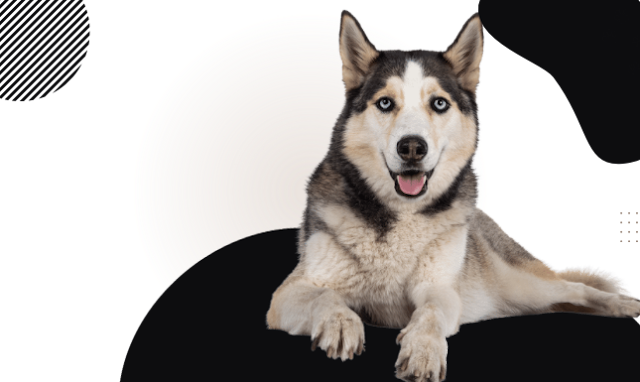Siberian husky health and nutrition
Introduction
If you are a proud owner or an enthusiast of Siberian Huskies, it is crucial to understand the health and nutritional needs of these beautiful dogs. Siberian Huskies are known for their stunning appearance, endurance, and playful nature. To ensure that your furry friend lives a long, healthy, and happy life, it is essential to provide them with the right health care and nutrition. In this article, we will explore the key aspects of Siberian Husky health and nutrition to help you make informed decisions for your beloved pet.
1.Balanced Diet for Siberian Huskies:
To maintain optimal health, Siberian Huskies require a well-balanced diet that includes proteins, fats, carbohydrates, vitamins, and minerals. High-quality commercial dog food that is specifically formulated for medium to large breeds is recommended. Look for products that list meat as the primary ingredient, such as chicken, beef, or fish, and avoid those containing fillers, artificial additives, or excessive grains. Consulting with a veterinarian can help you determine the appropriate portion sizes and feeding frequency based on your dog's age, weight, and activity level.
2. Protein-rich Diet:
Protein is essential for Siberian Huskies as it supports their muscular development and overall energy levels. Including protein sources like lean meats, fish, eggs, and legumes in their diet is crucial. However, be cautious with the amount of protein, as excessive intake may lead to health problems. Consulting with a veterinarian will help you determine the ideal protein intake for your Siberian Husky.
3. Adequate Hydration:
Siberian Huskies have a thick double coat, which means they are highly susceptible to overheating. Providing fresh and clean water at all times is vital to prevent dehydration, especially during hot weather or vigorous exercise. Consider investing in a large water bowl or even a pet fountain to encourage regular drinking.
4. Essential Nutrients:
Besides proteins, Siberian Huskies require other essential nutrients for their overall health. Omega-3 and Omega-6 fatty acids are crucial for maintaining healthy skin and a shiny coat. These can be obtained through supplements or by including foods like fish, flaxseed, and chia seeds in their diet. Additionally, vitamins and minerals such as Vitamin A, E, D, calcium, and phosphorus are necessary for their bone health and immune system function. Balanced commercial dog food usually contains these essential nutrients, but consulting with a veterinarian can help ensure their adequacy.
5. Avoiding Overfeeding and Obesity:
Siberian Huskies have a high metabolism and are naturally athletic. However, they are prone to weight gain if overfed or given excessive treats. Obesity can lead to various health problems like joint issues and heart disease. Regular exercise and portion control are crucial for maintaining a healthy weight. Consult with your veterinarian to determine the appropriate caloric intake and create an exercise routine suitable for your Siberian Husky.
Recommend portion sizes for different age groups:
Feeding Siberian Huskies the appropriate portion sizes for their age is crucial for their overall health and well-being. For puppies, it is important to feed them small, frequent meals throughout the day as their stomachs are still developing. A general rule of thumb is to feed them around 1/2 to 1 cup of high-quality puppy food per day, divided into three to four meals.
As they transition into adulthood, their portion sizes can decrease to around 1 to 2 cups of food per day, split into two meals. It is important to monitor their weight and adjust portion sizes accordingly to avoid under or overfeeding. For senior Huskies, their metabolism slows down, so it is recommended to decrease their portion sizes to prevent weight gain. Additionally, consulting with a veterinarian can provide personalized guidance on portion sizes based on the Husky's individual metabolism, activity level, and any specific health needs.
Health issues that are common in this breed and how nutrition can help prevent or manage them:
One common health issue in Siberian Huskies is hip dysplasia, a condition where the hip joint does not develop properly, causing pain and mobility issues. Another concern is progressive retinal atrophy (PRA), a degenerative eye disease that can lead to blindness. Additionally, Huskies are susceptible to skin allergies and digestive sensitivities. While genetics play a significant role in these health conditions, nutrition can play a crucial role in managing and preventing them.
A balanced and high-quality diet designed for the specific needs of Siberian Huskies can help promote joint health, support the immune system, and maintain a healthy skin and coat. Essential nutrients such as omega-3 fatty acids, glucosamine, and antioxidants can be beneficial in managing these potential health issues. It's essential for Husky owners to consult with veterinarians or canine nutritionists to ensure they provide their furry companions with the appropriate nutrition to help mitigate these common health concerns.
Siberian husky feeding guide Maintain a healthy weight with these tips
- Keep your dog's vaccinations up to date.
- Take your dog to the veterinarian for regular checkups.
- Brush your dog's coat regularly.
- Trim your dog's nails regularly.
- Clean your dog's ears regularly.
- Bathe your dog regularly. Watch for signs of illness and take your dog to the veterinarian if you notice anything unusual.
Conclusion
Taking care of a Siberian Husky's health and nutrition is vital to ensure a long and happy life for your beloved pet. Providing a balanced diet, proper hydration, essential nutrients, and regular exercise are key factors in maintaining their overall well-being. By following these guidelines and consulting with a veterinarian, you can help your Siberian Husky thrive and enjoy a healthy and active lifestyle.





0 Comments